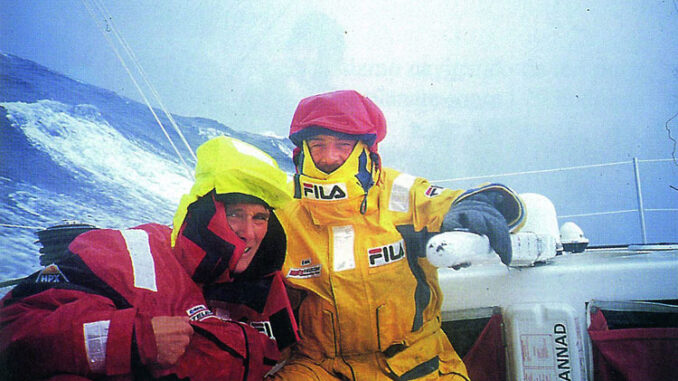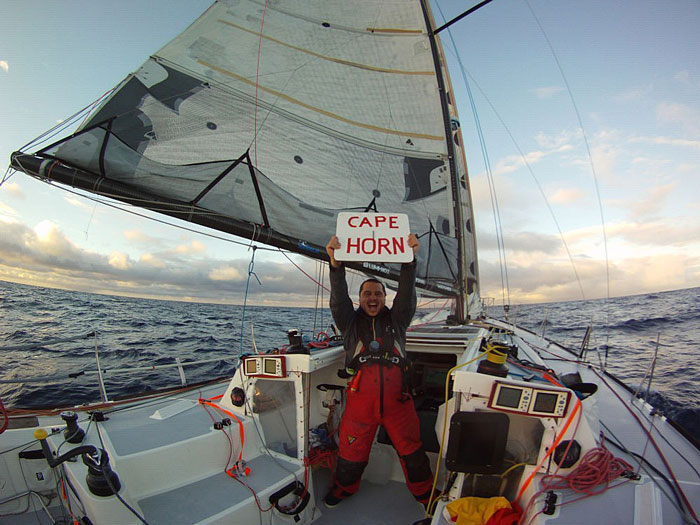
8/7/2022 – by Helena De La Gandara, Global Solo Challenge – When it comes offshore yacht racing, competition itself is a challenge that can be affected by many factors, personal or external. You have to take into account many factors: the difficulty of competing around the world without other to share the experience with, counting only on your own resources, the implacable force of the oceans, the many risks of collisions with boats, landmarks or even ice. All of this and much more is part of an offshore challenge such as the Global Solo Challenge.
When it comes to ocean yacht racing, many factors affect the challenge and the competitive element. You can rely only on yourself whilst dealing with some of the worst weather conditions known to sailors, the risk of collisions with other boats or floating debris, and even ice in certain areas. The Global Solo Challenge will be a test of endurance for all its participants.
A challenge some compare to climbing Mount Everest. However, if nowadays around one thousand people every year attempt to reach the peak of the highest mountain in the world, a few dozen people set out to circumnavigate the globe solo.
All extreme challenges like these share similarities (whatever the nature of the sport), however, if there is one thing that defines solo round the world yacht racing it’s the unconditional mutual support among participants.
From September 2023, a few dozen men and one woman will face the great ocean storms with monstrous waves, savage winds that can reach hurricane force, and all the risks that these situations entail – being shipwrecked, breaking a mast, or having an accident on board – and in all this, they will be alone.
If there is one thing that defines these sailors is the solidarity towards each other. They are “Gentlemen of the Oceans” (as they were called by Isabelle Autissier, the first woman to have completed a solo world navigation in competition), men and women who, in the event of an emergency or an accident involving one of the participants, will travel miles and miles, forgetting about the race, with the sole purpose of helping their fellow competitors in distress.
The formidable Atlantic, Pacific, and Indian Oceans allow for situations in which competitors find themselves hundreds of miles apart. There can be circumstances in which the sheer immensity of the Oceans and the fact of being in the middle of nowhere don’t allow for airborne or seaborne rescues. In these situations, the Gentlemen of the Oceans are the only ones who can intervene to help their fellow competitors.

With this in mind, in addition to the safety protocols at sea, organisers of the Global Solo Challenge have developed a starting system conceived to give participants the chance of reaching the most critical stages of the race more or less as a compact fleet.
In La Coruna, the start will be staggered as boats will be divided in groups based, among other things, on their rating certificates, so that the slowest and smallest boats will set off on 2 September 2023, while the boats with the best performance rating will have to wait until 19 November before they can start their adventure. In the meantime, the intermediate groups will start their race between the slowest and the fastest group.
As a direct consequence, when the fleet reaches the Southern Ocean, it will be reasonably compact, and boats will be close in the event of anyone needing assistance.
The risk certainly remains, but mutual support among participants is one of the fundamental values upheld in a challenge like this. There are hundreds of stories about extreme situations and the unselfishness and spirit of collaboration of these Gentlemen of the Oceans, especially in solo races around the world, but the most famous have been for sure those involving, among others, Jean “The King” Le Cam and Isabelle Autissier.
Frenchman Jean Le Cam (known as “The King” for his impressive career as solo sailor in round the world races) has experienced selfless camaraderie both as a rescuer and a rescuee.
In 2020, while competing in the French Vendée Globe, he played a crucial role in a nightmare situation. On 1st December that year, Frenchman Kevin Escoffier (PRB) hit an unidentified floating object at high speed and his Imoca60 broke in half and started sinking in no time. The closes boat at the time was Le Cam’s “Yes We Cam”. Without thinking twice, having heard the organisers’ emergency call over the radio, Le Cam changed his route and headed to the PRB’s position. After almost 12 hours of intense searching, his unselfishness and self-control paid off and he managed to rescue Escoffier.
However, the “rescuer” – who was in podium position when he responded without hesitation to the SOS and ensured a happy ending to the incident – in the past had learned the meaning of the words “Gentlemen of the Oceans” from personal experience.
In 2009, having lost his keel near Cape Horn with his 60-foot boat upturned, Le Cam was in the same situation in which Escoffier would find himself years later. In that case, it was Vicent Riou who put his racing ambitions aside to go to Le Cam’s rescue after he was spotted by a Chilean military aircraft.
Mutual support at sea is something that French solo sailor Isabelle Autissier experienced first hand when she found herself in a similar situation during the Around Alone race in 1998. The Frenchwoman capsized and was rescued by Italian skipper Giovanni Soldini, who turned 180º and sailed 200 nautical miles to rescue her.
All the passionate participants in this Global Solo Challenge will set off knowing one thing for sure: in a race like this, should things turn for the worst, they can count on each other. Riccardo Tosetto, William MacBrien, Dirk Gunst, Juan Mederiz and Philippe Delamare are some of the participants in the Global Solo Challenge who appreciate this.
They say that “life gives you back what you give out”. In this case, the spirit of mutual support among these Gentlemen of the Oceans is encoded in their DNA.